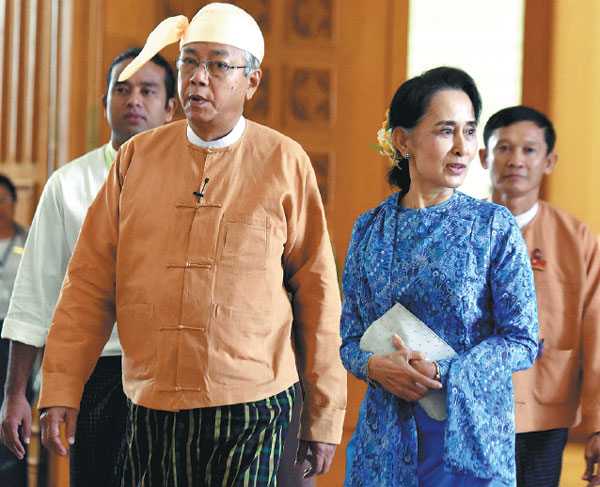Envoy upbeat on Myanmar ties
'A prosperous and stable neighbor serves China's best interests'
Ties between China and Myanmar will embrace an even brighter future after Myanmar's political transition, according to the Chinese ambassador to the Southeast Asian nation.
Hong Liang said a stable and economically prosperous Myanmar also contributes to China's economic and security interests.
|
Myanmar's new president U Htin Kyaw and National League for Democracy party leader Aung San Suu Kyi arrive at parliament for the presidential inauguration ceremony in Naypyitaw on Wednesday. Stringer / Reuters |
"When our two countries established diplomatic ties, we decided to take the Five Principles of Peaceful Coexistence, which have become internationally recognized norms governing nation-to-nation relations, as a guide to our bilateral ties. We will continue to uphold these principles," the ambassador said.
Hong made the remarks in an interview with China Daily in Yangon before U Htin Kyaw was sworn in as the country's new president on Wednesday.
U Htin Kyaw, from the ruling National League for Democracy, won the presidential election on March 15 through a secret ballot held by a NLD-dominated parliament.
There are high expectations that he and his party will push for domestic national reconciliation as well as boost economic and social development to improve people's livelihoods.
The presidential inauguration ceremony was held in Naypyitaw, Myanmar's capital.
The NLD, led by its leader Aung San Suu Kyi, swept to victory in elections in November.
Since then, ways in which the NLD will lead Myanmar onto a better road to development and handle its relations with key international partners, including China, have been in the regional and global spotlight.
Sharing a border of more than 2,000 kilometers, China and Myanmar have maintained good-neighborly ties for more than six decades.
A new government in Myanmar is widely perceived by both countries as a good opportunity for them to re-engage and reconnect with each other.
Xu Liping, a senior research fellow of Southeast Asia studies at the Chinese Academy of Social Sciences, said Myanmar generally pursues a balanced foreign policy under which the country will not totally depend on a single major power.
"The U Htin Kyaw administration's attitude toward China is certainly friendly," Xu said.
But uncertainties also exit, such as whether possible conflicts between Myanmar's military and armed ethnic groups would harm China's security interests, he said.
Nyunt Maung Shein, chairman of the Myanmar Institute of Strategic and International Studies, said, "Myanmar's new government will pursue friendly ties with China, which is very important to Myanmar in economic, diplomatic and security fields."
According to the scholar, there is plenty of room for bilateral cooperation.
Apart from enhancing cooperation on energy and infrastructure, the two countries can work more closely in nontraditional security fields, such as combating drug trafficking, human trafficking, arms smuggling and other cross-border crimes.
Since Myanmar opened up to foreign investment in 1988, China has invested $15.42 billion in 115 projects there, accounting for 26 percent of the total foreign investment in Myanmar by the end of last year.
In recent years, China has remained the biggest foreign investor in Myanmar. While Chinese companies are willing to follow this trend with more business opportunities opening up, the business community in Myanmar also has high expectations of cooperation with China.
Aye Lwin, joint secretary-general of the Union of Myanmar Federation of Chambers of Commerce and Industry, has traveled to China many times.
"A distant relative is not as good as a near neighbor," he said, quoting a Chinese proverb to describe the importance of ties between the two countries.
Wang Qingyun contributed to this story.
Contact the writers at wanghui@chinadaily.com.cn
Timeline of a troubled nation
1885: Burma (as it was then known) becomes a province of British India.
1941-45: Japan occupies Burma during World War II.
1948: Burma attains full independence from the British on January 4.
1962: General Ne Win seizes power in a coup.
1988: Nationalist hero Aung San's daughter Aung San Suu Kyi emerges as a key opposition leader.
1989: The country's name is changed to Myanmar.
1990: Suu Kyi's National League for Democracy wins a landslide victory in elections.
1991: Suu Kyi wins the Nobel Peace Prize while under house arrest.
1992: Than Shwe becomes the new leader.
2007: Major protests dubbed the "Saffron revolution" break out.
2008: Vast areas of the Irrawaddy Delta are devastated by Cyclone Nargis, which leaves some 138,000 people dead.
2010: Suu Kyi is released from house arrest.
2011: The junta cedes power to a quasi-civilian government.
2015: In November, Suu Kyi's NLD wins a landslide victory in the first free and fair elections in decades.
2016: A lengthy power transition follows.
AFP



















